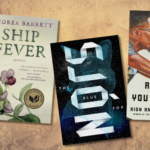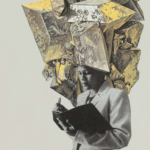
The Worst Dead-End Questions to Ask in Book Club
Let us first ask: what is a dead end? A dead end is a road that you travel down for a little while until you hit its conclusion and it can take you no further. I did not check Webster’s, but I feel relatively confident in that assessment. What, then, is a dead-end question? A dead-end question will keep you moving for a little while, but once it hits the end of the road, it’s over. There are no other scenic lanes branching off, no alternate routes to explore. Imagine this: you pose a question to your book club. Everyone goes around in a nice circle and answers the question. People nod politely while others share their reply. And then everyone turns back to you. You lob another question out. Same thing. Circle circle circle. Nod nod nod. You start to sweat profusely. This isn’t the rigorous discussion you had hoped for!!!!
I am interested in how we can cut down on the amount of sweating in book clubs. How to avoid a dead-end question?
Let me first say: there are no bad questions in book club. Sometimes, you need to throw a softball just to break the ice. But how do you trick, nay lure, your book club members into an interesting discussion, make them feel comfortable enough to express maybe even controversial opinions around people who are more like work friends than sleepover friends? It’s all about asking the perfect question at the perfect time. Any question can be a dead-end question if asked at the wrong time, but some are more likely to fall flat than others. Here are eight examples:
What did you like most about the book?
Not a bad place to start, sure, but is this going to spark ongoing discourse? Probably everyone is going to go around the room and say something, and probably everyone else will mumble, “same, same.”
Which character did you like the most?
See above explanation.
What was a favorite quote from the book?
Ok, sure, we can go around in a circle and learn about what people are most likely to get tattooed on their forearms, but is it going to spark the conversation into a life of its own? Hmmm.
What other books have you read by this author, and how did this one compare?
Sure, fine, maybe if everyone else has also read those books, otherwise this feels like a way for one or two people to kill time until you can start drinking wine and talking about Housewives. Maybe try “Would you read another book by this author? Why or why not?”
Did you see X plot twist coming?
Ok first of all, spoiler alert, for those who did not come prepared. Also, what are you really discussing here? Does it matter if you did or didn’t see the plot twist coming? Are we all just going around in a circle bragging about how perceptive we are? Is there a place this goes after everyone says whether they were shocked or vindicated?
What’s your biggest takeaway from the book?
Again, a perfectly fine question for everyone to go around in a circle and give a perfectly fine answer. But is it sparking discussion?
Did you know about X historical element before reading the book?
I do think that sometimes veering towards the political can be discussion-inducing, but basically, quizzing people on their knowledge of some historical event explored in a book feels like a good way to get people to clam up. Maybe try “How did the book change your understanding or perspective on X event in history?”
Did you identify with X character’s struggle?
I do think that getting people to talk about their own lives has the potential to spur discussion, but I think this question reveals more about the asker than it will reveal about the responders. Maybe something more open-ended, like, “Which character did you most identify or empathize with and why?” People may be surprised by what others say rather than answering essentially a yes or no prompt.
Listen, don’t let this dissuade you from starting or joining a book club. It’s mostly about getting together with people you like, motivating each other to keep reading, and introducing each other to new books and authors, right? If sometimes you have to lob an easy-to-ask and easy-to-answer question to the group just to open things up, well, I get it. But if you’re looking for those questions that will spark the discussion into a self-sustaining fire, I would steer clear of those above.










